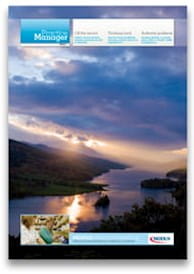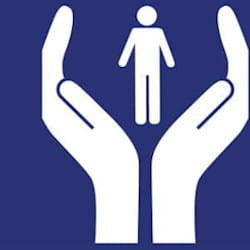"SOME people joke we’re on the road to nowhere," says Linda Entwistle.
And you can understand why in travelling the 'tourist route' to the village of Kinloch Rannoch in the Perthshire hills of Scotland. The narrow road off the A9 north snakes through the countryside for 15 miles before reaching the eastern shore of Loch Rannoch. Passing the village it twists another 15 miles to its terminus in the mountain wilderness of Rannoch Moor.
Linda is the healthcare assistant/receptionist at the Kinloch Rannoch Medical Practice and to her the isolation is part of the magic of the job. The practice is the most remote in the NHS Tayside region and also one of the most dispersed with a list of just over 600 patients in 250 square miles served only by B class roads.
Most of these patients live in Kinloch Rannoch proper – a postcard Victorian village with an outlook dominated by the towering Munro (mountain over 1000 metres) of Schiehallion. Just leaving the village you pass a modern building on the right. This is the large new health centre and practice manager Karen Brown has worked here since it was built in 2003 and before when the practice occupied a small bungalow across the road.
Karen manages a staff of five, including Linda, as well as a part-time practice nurse and three part-time receptionists. Kinloch Rannoch has three doctors working sessions to provide 5-day single-handed GP cover. The nearest community hospitals are in Pitlochry and in Aberfeldy, both 20 miles distant, and the district hospital is in Perth although many of the services have now been centralised to Ninewells over 70 miles away in Dundee.
"And it’s not just the mileage that makes things difficult but also the road – dodging timber lorries, tourists taking photographs, caravans, buses and sheep," says Karen.
The location presents some unique challenges for the practice not uncommon to many remote and rural practices in Britain – long tenuous transport links, the need for extended clinical skills in pre-hospital and emergency care, difficulties in arranging ongoing training and providing holiday and sick cover in a small part-time staff.
"I do enjoy my job. I really enjoy it. I don’t wake up in the morning thinking – oh I have to go to work," says Karen. "But it’s always busy. You can never just sit here and do your knitting."
Before 2006 Kinloch Rannoch was a single-handed GP practice with only one partner and a part-time associate. Together the two doctors provided GP cover 24/7 including on-call service. Before the retiral of the principal GP in 2008 NHS Tayside had begun to consider the position of single-handed GP practices in light of the new GMS Contract and the Shipman Inquiry. It was decided that having only one full-time doctor in the area was not safe.
Applications for the replacement of GP services were invited and a call went out for tenders to amalgamate the practice. Aberfeldy Medical Practice won the contract and Kinloch Rannoch became an affiliated sister practice. For Karen this meant that some of the financial decision-making as practice manager was taken away from her but she retains responsibility for much of the site management – HR, health and safety and IT.
"The change did cause a lot of consternation in the village because everyone thought at the time that they would close us down and patients would have to go across to Aberfeldy," she says. "But in the end I think it’s worked out well with the majority of our patients hardly noticing any change at all."
A VILLAGE LIFE
Karen is in a good position to understand the concerns of her community. She first came to Kinloch Rannoch in 1977 from New Zealand on a six-month travelling holiday. She met her husband – a native of the village – while working in a local hotel and never left. For many years she was an assistant bursar at a local private school and when that closed she was hired as receptionist at the medical practice and stayed in the job until the acting practice manager retired.
"They asked me if I wanted to do the job and I said 'no'. And then they asked would I do if for just 6 months. Five years later and I’m still here."
Working in a small community medical practice presents some unique difficulties, says Karen.
"You do have to be very careful about confidentiality. It’s a problem for all the staff. I can’t say to my husband when I go home at night, oh I saw ‘X’ today. Or if there’s a difficult situation, I can’t discuss it because he’ll know the people involved."
There is also no such thing as anonymity and for Karen even less so as she is also the district registrar, recording births and deaths, and performing weddings, sometimes in a small conference room inside the health centre.
"At one time they were talking about sending the service off to Aberfeldy or Pitlochry but I felt it was important to keep it here. So I agreed to take on the job."
EMERGENCY AND OUT OF HOURS
Much of the year Kinloch Rannoch is a quiet place but in the tourist season the population can expand by up to 800 people with visitors staying in hotels, time-shares and the local caravan parks and camping grounds. One weekend in the summer an orienteering competition attracted 3000 participants. Most days the practice will see some TRs or temporary residents attending with hillwalking casualties, sprained/ broken ankles, tick bites, infections or forgotten medication.
A great bonus to both visitors and residents is the fact that Kinloch Rannoch is a dispensing practice eliminating the need for patients to make a 40-mile round trip to get common acute and repeat prescriptions.
But perhaps the most challenging – and contentious – aspect of a remote practice like Kinloch Rannoch is out-ofhours (OOH) and emergency care. The practice has a transponder linked directly to the ambulance service and the doctors will often be the first on the scene at road traffic accidents.
"If there’s an emergency, the doctors must drop everything and go, even if it’s in the middle of a surgery,” says Karen. “Fortunately our regular patients are very understanding about this."
The doctors all have special training in emergency care and the practice is kitted with a Sandpiper Bag as well as a defibrillator. Common emergencies include minor road traffic incidents, obstetric cases and suspected myocardial infarctions.
"We are one of the few practices in Scotland where doctors carry medications such as metalayse to help dissipate the effects of heart attacks."
Emergency and OOH care is also an issue that has recently thrust Kinloch Rannoch into the media spotlight. Back in May 2006 the practice opted out of OOH service provision and it is now provided by NHS 24 along with a call-out service from Aberfeldy and Pitlochry. The move caused anger and concern among some members of the community and has sparked some media attention in the newspapers.
Recently a local resident paid for an advert in GP magazine for a doctor to provide separate out-of-hours GP service for the area as it was felt that relying on a service based miles away was dangerous. The controversy is still boiling and Karen admits the loss of the practice OOH care has caused a "hoo-ha" in the community.
"But we see the other side of it. We used to have doctors on duty 24/7 for three weeks or more, being disturbed at night and sometimes for things that were not life-threatening – a stomach ache or diarrhoea. The doctors were not on the ball for the next day. It’s much safer now."
Despite all the frustrations of her job Karen says she wouldn’t change her situation or her role in the village.
"I grew up in a small town in New Zealand and both my parents were heavily involved in our community. I think I’ve inherited that mentality – what you put into a community is what you get out of it."
Jim Killgore is an associate editor of Practice Manager
This page was correct at the time of publication. Any guidance is intended as general guidance for members only. If you are a member and need specific advice relating to your own circumstances, please contact one of our advisers.
Read more from this issue of Practice Manager

Save this article
Save this article to a list of favourite articles which members can access in their account.
Save to library


